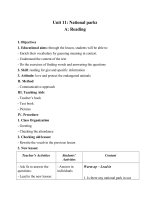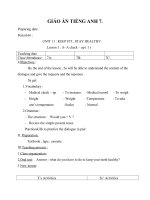Giáo án Tiếng Anh 10 unit 11: National parks
Bạn đang xem bản rút gọn của tài liệu. Xem và tải ngay bản đầy đủ của tài liệu tại đây (310.18 KB, 11 trang )
GIÁO ÁN ENGLISH 10.
DOP
:
DOT
:
Part A: READING (TCT-65)
CLASS: 10B3
•
Objectives
Aims: To give sts practice in reading about national parks.
Knowledge: Some new words.
•
Methods and materials
Integrated, mainly communicative skills. Pictures.
• Procedures
Time
5’
Teacher’s activities - Stages
Warm up
T asks sts some questions about national
parks:
- Have you ever been to a national park?
- Can you name some national parks?
- What trees and animals can you see there?
10’
Sts’ activities - possible answer
Presentation
T shows sts some new words & expressions.
- be located (exp) (translation, ex)
- contain (v) (translation)
- study (v) (translation, 2 meanings)
- dry-raining season (explanation)
- be surprised at (exp) (translation)
- a variety of sth (exp) (translation)
- recognize (v) (translation)
- be dependent upon/on (exp) (trans)
- feature (n) (translation)
Sts answer questions in pairs.
GIÁO ÁN ENGLISH 10.
- sub-tropical wilderness (trans)
- tropical-temperature zones
- threaten (v) (translation)
Practice
5’
T asks sts to read the 3 paragraphs about the 3
national parks and do the task.
Sts read and do the task.
Task 1: Words-definitions.
5’
Task 2: Answering questions.
2. contain
5. sub-tropical
3. species
6. contamination
4. survival
1. 200 square kilometers.
10’
2. Because the rainy season is over.
3. They can learn about the habits of animals
and how one species is dependent on another
for survival.
4. In the Orphanage, orphaned or abandoned
animals are taken care of.
5. Everglades National Parks is endangered
because of the toxic levels of chemicals in the
water.
6. If more chemicals are released into the
water, plants and animals will die/ be killed/
destroyed.
5’
CONSOLIDATION
T asks sts to discuss:
What National Parks they would like to visit
most and why.
DOP
:
DOT
:
GIÁO ÁN ENGLISH 10.
CLASS: 10B2
•
Part B: SPEAKING (TCT-66)
Objectives
Aims: To give sts practice in expressing regrets..
Knowledge: Conditional Sentence type 2.
•
Methods and materials
Integrated, mainly communicative skills.
• Procedures
Time
5’
Teacher’s activities - Stages
Sts’ activities - possible answer
Warm up
T asks sts some questions.
Sts answer the questions.
- Do you like going on excursions?
- What problems do you think you may have?
Why?
Presentation
10’
Task 1: Matching
T asks sts to match things in column A with
corresponding consequences in column B.
T explains how to express regrets through the
use of conditional sentence type 3.
If clause (Past perfect)
Sts do the task.
1. f
4. g
7. a
2. e
6. b
8. d
3. h
6. c
Main clause (Perfect Conditional)
If S + had + V3, S would have + V3
Sts make some sentences on the given
formula.
Practice
10’
Task 2: Talking about regrets.
T asks sts to talk about regrets using ideas in
task 1.
Sts do the task.
1. If we had brought enough good and drinks,
we wouldn't have spent a lot of money eating
in expensive restaurants.
2. If some of us hadn't had food poisoning, we
GIÁO ÁN ENGLISH 10.
could have enjoyed out visit.
3. If we had had rain coats, we wouldn't have
got wet and have had a cold.
4. If some of us hadn't left our luggage on the
coach when we arrived, we could have had
clothes and money with us.
5. If we had been careful when walking in
Huong Pagoda, we wouldn't have got lost.
6. If we hadn't thrown waste in the forest, we
wouldn't have got a fine.
7. If we had stayed there more than one day,
we could have visited all the pagodas.
Sts work in pairs, take turns to be Nga.
15’
Task 3:
T asks sts to work in pairs talk about problems
and regrets about the excursion to Huong
Pagoda.
5’
CONSOLIDATION
T goes over conditional sentence type 3.
DOP
:
DOT
:
GIÁO ÁN ENGLISH 10.
CLASS: 10B2
•
Part C: LISTENING (TCT-67)
Objectives
Aims: To give sts practice in listening about a National Park.
Knowledge: Some new words.
•
Methods and materials
Integrated, mainly communicative skills. Pictures.
• Procedures
Time
5’
Teacher’s activities - Stages
Sts’ activities - possible answer
Warm up
T shows sts some pictures of Cuc Phuong
National Park and asks them some questions.
Sts answer the questions.
1. Where is it?
2. What’s its area of the rainforest?
Answer from the reading.
3. When is the best time to visit it?
4. What can be seen in Cuc Phuong National
Park?
10’
Presentation
T presents some new words:
- threatened and endangered species.
- flora – fauna
- attack
- ethnic minority
- enemy
(translation and repetitions)
Practice
5’
T asks sts to listen to the tape and do the tasks
that follow.
Task 1: Filling in the missing information.
Sts listen to the tape and do the tasks.
GIÁO ÁN ENGLISH 10.
7’
1. 1960
2. 100 km south west of
3. 100,000 visitors
8’
Task 2: Answering questions.
4. about 2000; 450
Sts listen to the tape again and answer the
questions.
5. surprise attack
1. It covers 3 provinces: Ninh Binh, Hoa Binh
and Thanh Hoa.
2. It is about 160 km.
3. They come there to see the work being done
to protect endangered species.
4. Nguyen Hue defeated the Quin invaders in
the spring of 1789.
5. They live mainly on bee keeping and
farming.
5’
CONSOLIDATION
After you listen
T asks sts to talk about the special features of
CP National Parks.
DOP
:
DOT
:
CLASS: 10A4
Sts works in pairs.
Part D: WRITING (TCT-68)
GIÁO ÁN ENGLISH 10.
•
Objectives
Aims: To give sts practice in writing a letter of acceptance or refusal.
Knowledge: Some certain expressions used for accepting or refusing.
•
Methods and materials
Integrated, mainly communicative skills. Charts.
• Procedures
Time
3’
Teacher’s activities – Stages
Warm up
T asks sts to work in pairs, one sts invite the
other to do something and the other answer the
invitation.
7’
Sts’ activities - possible answer
Sts work in pairs.
Presentation
T shows sts a note of ways of accepting or
refusing an invitation.
Accepting
Yes, I’d like to…
Yes, I’d love to...
Sts can add some more expressions.
Refusing
I’m afraid I can’t
come because…
I’d love to, but…
Yes, that’s a great
idea.
I’m sorry I can’t
come because…
Yes, I’d be delighted
to…
Practice
5’
Task 1: Filling in blanks.
T asks sts to use expressions in the notes to fill
in the blanks to complete the letters.
Sts work in pairs.
1. (accept) (ex: I’d like to…)
2. (refuse) (ex: I’m afraid i can’t come
because…)
15’
Task 2: Arranging to form a letter.
3. (accept) (ex: That’s a great idea.)
T asks sts to arrange the sentences to make a
complete letter.
Sts work in pairs.
1. d
3. c
5. f
GIÁO ÁN ENGLISH 10.
T then shows them the letter in the full form
and asks sts to work out the form of a letter of
acceptance and refusal (referring).
Acceptance (letter)
2. e
4. a
6. b
Refusal (letter)
- Thanking for the invitation.
- Thanking for the invitation.
- Showing your interest.
- Showing your interest.
- Accepting.
- Refusing.
- Feelings about the event.
- Regretting.
- Action to reply the invitation.
- Wishing.
- Closing.
- Closing
Task 3: Writing a letter of acceptance or
refusal.
T asks sts to write a reply letter to an invitation
to CP National Park next weekend on a picnic.
10’
5’
Sts write individually for public check.
CONSOLIDATION
T goes over the form of the 2 letter.
DOP
:
DOT
:
CLASS: 10B3
•
Part E: LANGUAGE FOCUS (TCT-69)
Objectives
Aims: To give sts some grammatical and pronunciation points..
GIÁO ÁN ENGLISH 10.
Knowledge: - Pronunciation /t/ - /d/.
- Grammar: Conditional sentence type 3.
•
Methods and materials
Integrated, mainly communicative skills. Portable board.
• Procedures
Time
5’
Teacher’s activities - Stages
Sts’ activities - possible answer
Warm up: Antonyms
T asks sts find antonyms of:
Sts give the antonyms of the given words.
Dangerous – near – best – polluted – dependent.
(safe – far – worst – unpolluted - independent)
PRONUNCIATION
7’
Presentation
T shows sts some examples and the way to
pronounce ‘ed’ after some verbs.
6’
Sts write down the rules.
Practice
T gives the sentences and some words
containing ‘ed’ and pronounces them.
Sts practice the sentences.
GRAMMAR
4’
Presentation
T asks sts to recall the form and usage of
conditional sentence type 1 and 2.
Sts recall the 2 forms and take some
examples of type 3.
T gives the form and usage of type 3.
- If + S + had + V3/Ved, S + would + have +
V3.
type 3 is used for an unreal action in the past.
Practice
Exercise 1:
Completing sentences using the correct verb
forms of the verbs given.
Sts do the exercise.
1. had known
5. would have enjoyed
GIÁO ÁN ENGLISH 10.
7’
Exercise 2:
2. had had
6. had known
Writing sentences.
3. would have gone
7. had stopped
4. would have passed
8. had called
7’
1. If the driver in front hadn't stopped so
suddenly, the accidents wouldn't have
happened.
2. If I had known that Lam had to get up
early, I would have woken him up.
3. If Hoa hadn't lent me the money, I
wouldn't have been able to buy the car.
4. If Mary hadn't been wearing a seat belt,
she would have been injure-d.
5. If you had had breakfast, you wouldn't be
hungry now.
6. If I had had some money on me, I would
have got a taxi.
Exercise 3: Making conditional sentences from
the given information.
1. If I had been working at the restaurant last
night, I would have waited on your table.
2. If they had been paying attention, they
would have I seen the sign marking their
exit from the highway.
7’
3. Carol would have answered the phone if
she hadn't
been studying.
4. If the sun hadn't been shining, we wouldn't
have gone to the beach yesterday.
5. If the music hadn't been playing loudly at
the restaurant, I would have heard everything
Mr Lee said during dinner.
2’
CONSOLIDATION
GIÁO ÁN ENGLISH 10.
T goes over the 2 types of conditional sentence.









